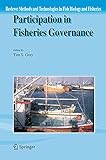Participation in Fisheries Governance [electronic resource] / edited by Tim S. Gray.
Series: Reviews: Methods and Technologies in Fish Biology and Fisheries ; 4Publisher: Dordrecht : Springer Netherlands, 2005Description: XXVI, 366 p. online resourceContent type:- text
- computer
- online resource
- 9781402037788
- 577.6 23
- 577.7 23
- QH541.5.W3
- QH541.5.F7
- QH541.5.S3
 eBooks
eBooks
Theorising about Participatory Fisheries Governance -- What Role for Public Participation in Fisheries Governance? -- Engaging Stakeholder Preferences Through Deliberative Democracy in North Sea Fisheries Governance -- The Role of Partnerships in the Governance of Fisheries Within the European Union -- Regionalisation of Fisheries Governance: An Empty Vessel or a Cornucopia of Opportunity? -- Fisheries Governance, Social Justice and Participatory Decision-Making -- Between Top-Down and Bottom-Up Governance: Dutch Beam Trawl Fishermen’s Engagement with Fisheries Management -- Co-Management at the Eleventh Hour? Participation in the Governance of the New England Groundfish Fishery -- Pparticipatory Governance in Inshore Fisheries Co-Management in England and Wales -- A Comparative Analysis of two Forms of Stakeholder Participation in European Aquaculture Governance: Self-regulation and Integrated Coastal Zone Management -- The Role of UK Statutory Nature Conservation Agencies in the Environmental Governance of Fisheries -- The Role of Environmental NGOs in Fisheries Governance -- The Participatory Role of the Media in Fisheries Governance -- The Role of Marine Science in Participatory Fisheries Governance -- Bringing Experiential Knowledge into Fisheries Science Advisory Processes: Lessons Learned from the Canadian Experience of Participatory Governance -- Local Ecological Knowledge, Science, Participation and Fisheries Governance in Newfoundland and Labrador: A Complex, Contested and Changing Relationship -- A Comparative Analysis of Three Modes of Collaborative Learning in Fisheries Governance: Hierarchy, Networks and Community -- Getting the Scale(s) Right in Ocean Fisheries Management: An Argument for Decentralised, Participatory Governance -- Scientific Knowledge and Participation in the Governance of Fisheries in the North Sea -- Participatory Fisheries Governance — Three Central Themes.
The chapters focus on three main themes: first, what value does stakeholder participation bring to fisheries governance? Its advocates claim that participation improves the quality of decision-making; resolves conflicts; and increases compliance with regulations. On the other hand, critics argue that participation is often unnecessary, ineffective, costly, time-consuming, and cosmetic. The second theme is the relationship between the participatory mode and the current switch from single species-based fisheries management to the ecosystem-based approach (EBA). In what way does widening the extent of public participation contribute to the EBA? Third is the vexed question of the relationship between fishers’ experiential knowledge and fisheries science: how far does fishers’ knowledge improve our understanding of the marine environment? The central message of the book is that while stakeholder participation is beneficial, it carries with it responsibilities as well as rights: all stakeholders have a public duty to act as stewards for the marine environment.


